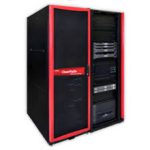Integrating Robotic Tape Libraries

In the late 1980s, StorageTek had given tape technology many more years of useful life by making robotic libraries efficient and reliable. They asked FCI to integrate their tape drives and libraries with Unisys platforms. While they had a fully-realized corporate structure for research, development, testing, marketing, sales, support and documentation, they outsourced many of those roles to FCI.
FCI developed EXEC local code to fully integrate the library with the OS 2200 operating system and make it easy to access in user’s tape ECL. FCI developed an application, running on the 2200 to interface with the library solution. The 2200 component intercepted tape requests and determined the user’s intention. Requests designated for the robotic system were routed and fulfilled there. Scratch tapes were protected and managed via integration with FCI’s product STAR-1100.
A product upgrade required TCP/IP, which was not available on OS 2200. Using a University of Maryland research code base, FCI implemented a TCP/IP stack on OS 2200.
FCI also implemented a similar solution on A Series systems.
FCI performed development, testing, documentation and 2nd / 3rd level support for these products. FCI also traveled to help StorageTek’s staff successfully complete large sales.
FCI continued supporting these products as corporate acquisitions brought them under the management of Sun, and then Oracle.
Massively Parallel Database Computing

At a time when data warehouses were aggressively scaling up and transaction times were critical, Teradata found technical and sales success with its massively parallel database machine. They saw an opportunity to sell their machine to several very large Unisys customers—provided the system could be integrated with OS 2200 and MCP (A Series).
FCI built an interfacing solution to run on the Unisys platforms. It allowed user programs to fulfill their database requests on the Teradata database machine. The MCP operating system (A Series) provided useful system libraries with extensible user exits. FCI used these to integrate the database machine with A Series.
On OS 2200, FCI needed to use a highly technical and very low-level EXEC I/O feature to implement the interface..
Teradata’s complete package included numerous utilities implemented in high-level languages. FCI ported these utilities to both OS 2200 and MCP.
FCI performed engineering development, testing, documentation, and pre- and post-sales support for Teradata. FCI staff traveled internationally to support Teradata’s successful sales efforts.
Award Winning Video Monitoring Solution
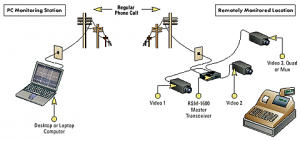
Today we think nothing of sending a large video clip in a text via smart phone. Or, we conduct a video call on our computer or smart phone. Yet, for many years the transmission of live, full color video required expensive premises installations and costly telecommunications services.
Some years ago, a manufacturer of video equipment was hoping to make a technical leap, which could bring big sales. They wanted to build an affordable video monitoring package which could operate on standard telephone lines. A small business owners would install the package in their store(s). Then, they could remotely monitor the live full-color video and audio feed, from their PC application—blocks or miles away.
With the solution in place, business owners or home users could monitor any location from a desktop or laptop PC. The capability to use POTS (plain old telephone service) dramatically reduced the cost and technical complexity of the solution.
FCI’s efforts helped our customer win the following awards:
Remote Video for Sobriety Testing
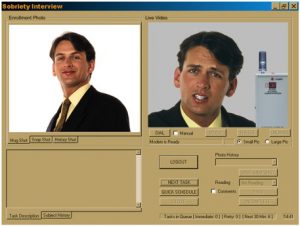
An industry leader in security monitoring, wanted to offer home arrest monitoring services to local and state authorities. They chose FCI to develop a unique video monitoring application, based on inexpensive video equipment, and implemented on a Windows server platform.
This specialized application enables operators at a central location to perform sobriety tests via remote video cameras. The application uses a central database of test subjects and a predetermined schedule to automatically initiate video calls to remote camera units.
The system initiates a call to the subject. The subject comes on screen. The monitoring professional can visually verify that the image on screen matches the stored image of the subject’s profile.
The monitoring professional can then supervise a sobriety test in real-time and record the results.
The system captures and records a photo of the subject while they are testing. Subjects’ profiles, test schedules, and results are all stored in a database. Monitoring staff use the client-server application and can also review results using an Internet browser. Appropriate test results can be transmitted to law enforcement and other government agencies.
Use of this remote video system for sobriety testing tremendously improves the efficiency, privacy and comfort of the subject’s experience. It automates the recording of the test, the identifying image, improving interfaces with law enforcement and compliance organizations.
MAPPER to BIS Migration

For a large Aerospace Company
A large aerospace company had several critical applications running on MAPPER, on Unisys 2200 mainframes. One system provided shop-floor applications for the manufacture of a civilian airplane. A similar, but completely separate system, operating under a different company division, hosted shop-floor functions for the manufacture of a military aircraft.
Corporate directions dictated a move off the mainframe and on to modern commodity hardware. The organization engaged FCI to help them migrate the RUNs and interfaces from MAPPER to Business Information System (BIS) on open systems platforms.
The complete scope included over 2,500 MAPPER RUNs and dozens of complex interfaces. To deal with the imminent end of life for several existing resources, the project dictated a highly aggressive deadline. The customer set up a cooperative work process. FCI fulfilled a good deal of the migration work. FCI also provided leadership and consulting to their own programmers, who completed their assigned portion.
FCI completed the project on time (within 10 calendar months) and under budget. The customer saved millions of dollars over the next several years.
For a Public Sector Organization
A large public sector organization had a crucial MAPPER application for gathering data on a daily basis. Key staff reviewed the data, made appropriate adjustments, and generated monthly and quarterly reports. These reports were mandated by a government agency and formed the basis for significant reimbursement funding for our customer.
This customer asked FCI to migrate this application from MAPPER on the mainframe to BIS on Windows servers. There is a set of known syntax differences between MAPPER and BIS. FCI used automated tools to make the migration more efficient and less risky.
A larger challenge was the age of the application. The data structures were designed at a time when MAPPER had many limitations. FCI helped the customer establish more efficient data structures. FCI has also had an ongoing support services arrangement with this customer. Over time, FCI has helped the customer implement more effective archiving techniques, satisfying an ambitious organizational mandate for archives reaching back a decade.
Sales Tracking, Credit Card Processing
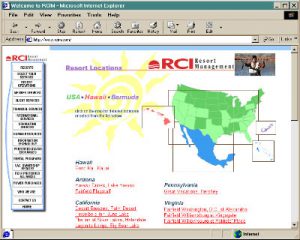
Sales, Inventory, and Shipment Tracking
A division of a large medical supply corporation provides doctors and clinics with replacement lenses for cataract patients. They needed to automate their customer reordering system. FCI developed an e-business application that enabled their customers to order lenses and insertion devices directly on-line. The application also tracks customers’ inventories and provides a quick means of tracking order shipments.
This saved them and their customers thousands of dollars. It substantially reduced customer frustration, and ensured prompt delivery of a critical product. FCI also successfully integrated the ordering solution with our client’s existing Baan ERP system.
Online Credit Card Processing
A company which was a leading supplier of services to time-share property owners needed to automate their reservation credit card processing. FCI built a fully automated and secure credit card application with a web interface. It enables their reservation facility to quickly process and verify credit card information.
After their improved website went live, their customers provided unsolicited feedback—that it was now faster and easier to make advance reservations at their favorite vacation resorts.
Establishing Feasibility for Innovative Web Integration
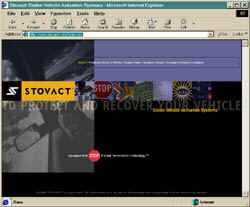
Technology is advancing so quickly that what is radically innovative and bleeding-edge can soon become routine. This project is good example.
A small company contacted FCI to explore the feasibility of implementing a web-based control center to track and disable a stolen vehicle. The scenario would unfold as follows. The owner of the stolen vehicle would contact the monitoring center. The monitoring center would use their browser-based application to observe the car’s progress via GPS tracking. Staff at the monitoring center would alert law enforcement with location information. Center staff could then issue voice commands to a speaker installed in the vehicle, and then, as appropriate, disable the forward progress of the vehicle.
FCI implemented the web portal which could track the car, based on GPS input. FCI also implemented a software server for managing messages delivered via a micro-burst sub-channel within a cell phone account.
The wireless messages were used for sending commands to the security system installed on the vehicle. Before permitting our subsystem to use the cell phone back channel, the telco insisted on stress-testing our message server for performance and reliability. They gave us the highest marks among the other implementations they had tested.
FCI successfully fulfilled established the feasibility of tracking the vehicle, monitoring its progress real-time on a map, and issuing voice and operational controls to the vehicle via wireless technology. Unfortunately, our customer’s bold vision was ahead of its time. The implementation was feasible, but not commercially viable. As bandwidth became less of a bottleneck, and tracking applications became routine, other highly-capitalized firms have implemented this idea commercially. For reasons of safety and public acceptance, to our knowledge, the capability to disable the vehicle has not been implemented to date.
Chemical Supply Tracking and Inventory
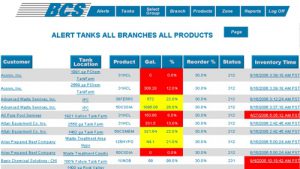
A company supplying chemicals at a bulk, wholesale level, delivered those chemicals to large tanks on their customers’ premises. The site manager needed to check inventory by physically reviewing a gauge at each tank. This caused several operational issues. If the local operator waited too long to re-order, they might impact their own production. If they ordered too soon, the supply company would be delivering a small amount, and essentially making a wasteful trip. They knew they could substantially improve their operations by automating the reporting of the levels in all of their many tanks.
They installed hardware at each tank which would send a MicroBurst™ message with the level reading. FCI deployed its MicroBurst™ message server and developed a database and web portal. The supply company could then review the level of every tank at any time.
This capability enables them to refill the tanks when necessary. It frees their customers from the concerns of monitoring and manually re-ordering critical supplies. It also eliminates wasteful trips to top off a tank, when it wasn’t really needed. FCI’s solution manages both the forward control channel (FOCC) used for paging, and the reverse control channel (RECC) used for MicroBurst packet transmission.
By taking advantage of FCI’s expertise, the chemical supplier has positioned itself a step above its competitors.
